5 Best Legal Tech For Litigation (2026’s Top Options)
5 Best Legal Tech For Litigation (2026's Top Options)
Many legal professionals will agree that litigation is one of the most difficult practice areas to find success in, whether it’s civil or criminal. It’s also worth noting that there’s so much at stake with litigation, including money, your client’s fate, and the law firm’s reputation.
But if there’s one thing successful lawyers will agree on, it’s that every law firm needs to adapt to technology as it changes.
In this guide, we will be going into one of the most important fields of legal tech: litigation tools. Discover the types of legal tech tools for litigation, the benefits of using such products, and how you can integrate them into your practice to serve clients even better.

Types of Legal Technologies for Litigation
The legal tech industry solves hundreds of problems for law firms, which span across multiple aspects of the legal profession, including litigation.
Here are types of legal tech that are particularly useful for law firms that focus on litigation, as well as arbitration or mediation:
- Discovery document generation: AI-powered tools like Briefpoint.ai automate discovery request and response drafting, which mostly eliminates the need for manual document creation and reduces hours of work to minutes.
- Case management software: Centralizes case files, deadlines, communications, and tasks to help litigation teams stay organized and make sure nothing is overlooked.
- Legal research platforms: AI-driven databases streamline legal research, offering quick access to case law, statutes, regulations, and predictive insights.
- Communication and collaboration tools: Secure messaging, video conferencing, and collaboration features make way for seamless interaction among legal teams, clients, and stakeholders.
- Trial presentation software: Supports real-time display of evidence, including documents, videos, and audio, to help attorneys present compelling arguments in court.
- Litigation analytics: Analyzes past rulings, judge decisions, and litigation trends to provide data-driven insights that strengthen case strategy.
How Can Legal Tech Help Litigation?
The legal industry is becoming more and more accepting of technology as it continues to evolve–and for all the right reasons. From a wider point of view, legal technology makes workflows easier, faster, and overall more efficient.
But if we look closer, the benefits of legal technology for litigation are clearer:
Maximizing Operational Efficiency
Legal technology introduces automation in various facets of litigation, including document management, billing, and case tracking.
This automation reduces the time legal professionals spend on administrative tasks, which allows them to allocate more resources toward critical thinking and case strategy development.
The result? Law firms and legal departments can handle cases more effectively, reduce delays, and improve the overall quality of their legal services.
Improving Accuracy and Risk Mitigation
Legal tech tools minimize the potential for human error by reducing the reliance on manual processes.
Automated document generation, for example, helps maintain consistency and accuracy in legal filings. In turn, this reduces the risk of mistakes that could lead to delays or negative legal outcomes.
Plus, litigation analytics can help identify potential risks and outcomes based on historical data, which allows for better-informed decision-making.
Refining Discovery and Evidence Management
Automated discovery tools are designed to handle vast amounts of electronic data and allow legal teams to efficiently identify, collect, and analyze relevant information.
This feature is an absolute must in a digital age where evidence often resides in electronic formats. Advanced search algorithms and analytics can uncover crucial pieces of evidence that might be overlooked manually, which can offer a strategic advantage in litigation.
Reducing Costs
While the initial investment in legal tech may be significant, the long-term savings are substantial. Law firms can reduce overhead costs just by simply automating routine tasks and improving efficiency.
Additionally, the precision and speed of legal tech tools can decrease the duration of litigation, which further cuts down expenses that often come with prolonged or delayed cases.
Upgrading Client Satisfaction
When you consider the benefits of legal technology, you can see that using legal technology contributes to higher levels of client satisfaction.
Clients benefit from quicker responses, more transparent communication, and potentially faster resolutions to their cases. More importantly, the ability to provide detailed insights and data-driven strategies can reinforce clients’ confidence in their legal representation.
Increasing Law Firm Profitability
Positive case outcomes almost always result in better law firm profitability, and that’s what both lawyers and clients want. Software solutions can increase the chances of a positive verdict via better legal research, stronger evidence, or even the absence of errors.
In turn, lawyers get their win, and happy clients are likely to bring in more potential clients to the law firm through word-of-mouth. Either way, the winning law firm will see a positive effect on their bottom line.
Best Legal Tech Litigation Tools Every Law Firm Should Have
While legal tech, in general, can yield positive results for a law firm, not all legal tech products are made equal. Legal practitioners still have to be selective when choosing the right stack of tools, especially when it comes to something as crucial as litigation.
Here’s a list of some of the best litigation tools to help you narrow down your search:
1. Briefpoint.ai
Briefpoint.ai is a discovery document automation tool that helps legal professionals generate responses and outgoing sets for Requests for Production, Requests for Admission, and Interrogatories.
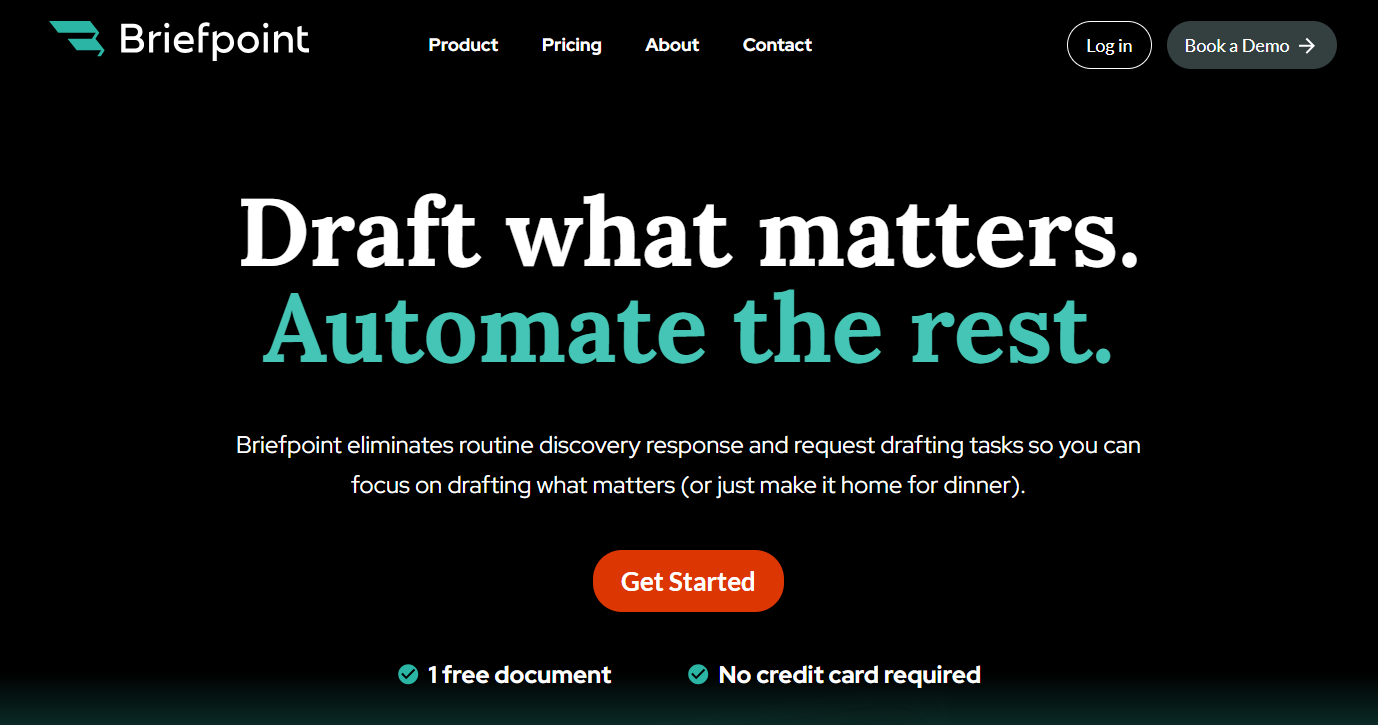
Instead of manually drafting discovery documents—a process that can take hours or even days—Briefpoint’s AI-powered system simplifies the workflow, reducing effort while maintaining accuracy.
With a simple three-step process, users can upload a discovery request, select objections and responses, and generate a formatted document that’s ready to finalize in Word.
It’s designed to cut down on repetitive tasks, improve efficiency, and minimize errors in discovery document preparation.
Best Features
- Automated discovery responses: Uses AI to extract details from discovery requests and generate responses in minutes.
- Built-in formatting compliance: Identifies court names and applies local formatting rules automatically.
- Smart objection selection: Lets users choose from pre-set objections, which makes it incredibly easier to respond to requests efficiently.
- Word document export: Provides a structured, mostly completed document that can be finalized in Word.
- Briefpoint Bridge: Helps you translate interrogatories into plain English, collect responses from clients, and plug in their answers into your legal documents.
Pros
- Saves significant time on discovery document preparation
- Reduces manual data entry and copy-pasting
- Ensures proper formatting based on court requirements
- AI-assisted response generation minimizes errors
- Intuitive interface with minimal learning curve
- Allows document downloads at any stage of the process
2. Clio
Clio is always going to be the go-to for case and practice management. It offers features that cover everything from document management and time tracking to billing and client communication.
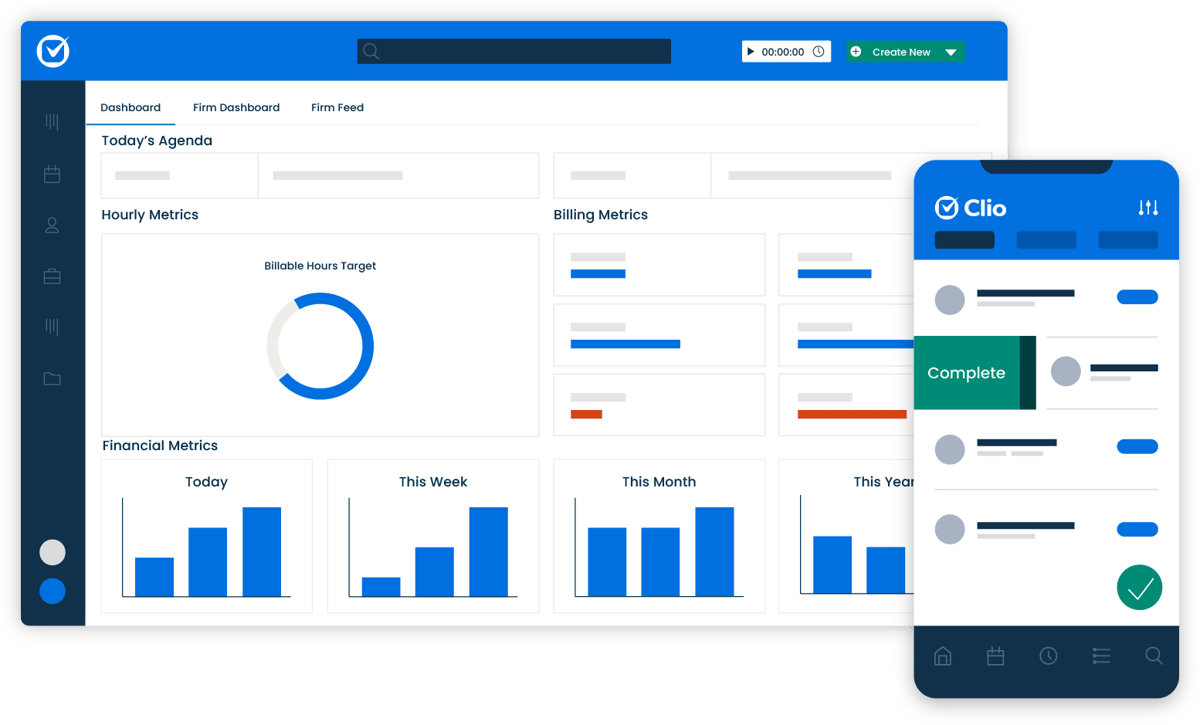
Source: G2
Plus, everything is on a cloud-based system, which allows easy access to case files and information from anywhere.
Best Features
- Case and document management: Stores case files, emails, and client communications in a centralized platform.
- Billing and invoicing: Automates time tracking, invoice creation, and online payments to simplify financial management.
- Client intake and CRM tools: Helps law firms manage leads, onboard clients, and maintain relationships.
- Cloud-based access: Enables remote work with secure access from any device.
- Extensive integrations – Connects with legal research tools, accounting software, and other third-party applications.
Pros
- Comprehensive case and client management features
- User-friendly interface with easy navigation
- Secure cloud storage with access from anywhere
- Customizable workflows and task automation
Cons
- Higher pricing compared to some alternatives
- Learning curve for advanced features
- Some features may require third-party integrations for full functionality
3. Lex Machina
Lex Machina is known for transforming raw legal data into strategic insights. This platform mines litigation data from a vast array of sources and applies sophisticated analytics to unearth patterns and trends that are not immediately apparent.
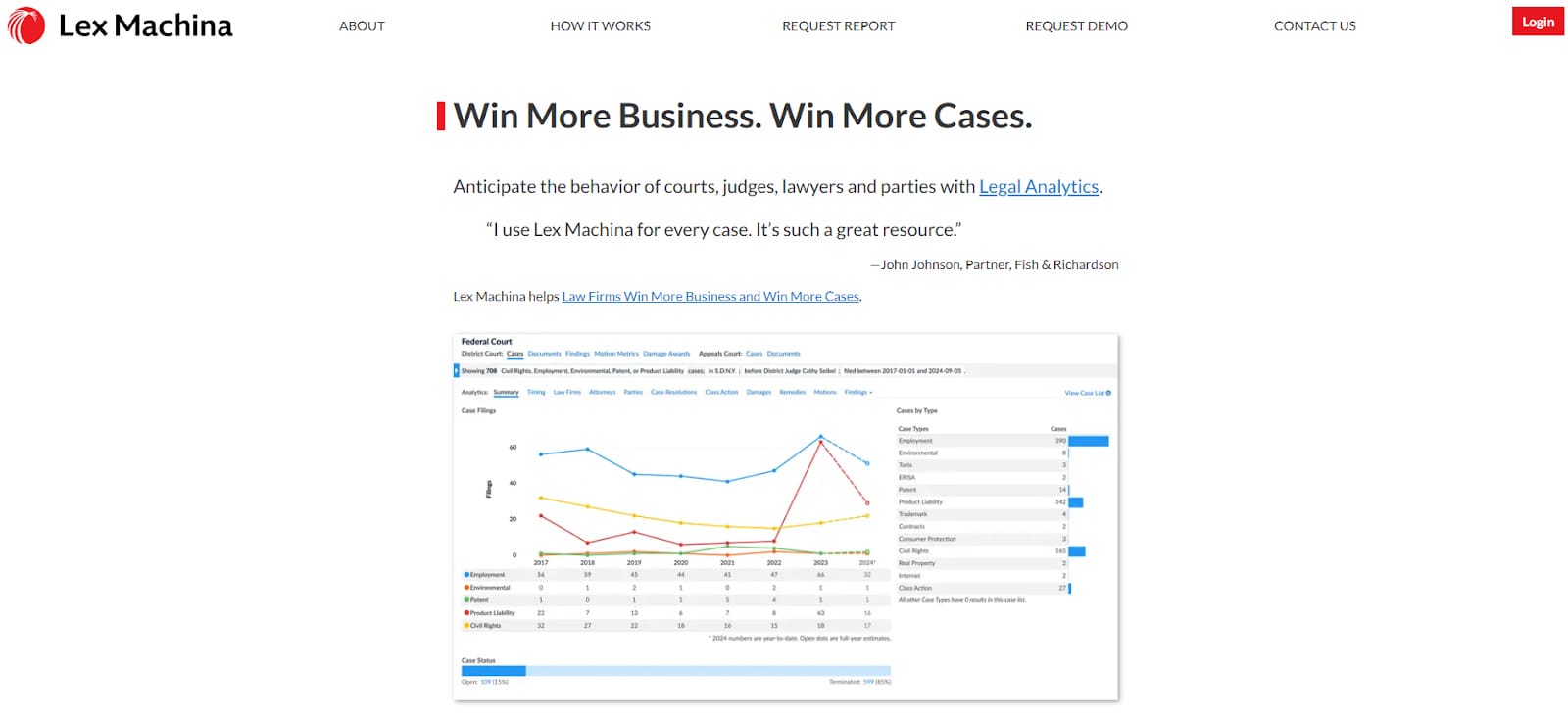
Source: LexMachina.com
By offering a detailed examination of judges’ rulings, litigation histories, and even the tactics employed by opposing counsel, Lex Machina gives legal professionals a deeper understanding of the legal battlefield.
Best Features
- Judge and court analytics: Tracks judge tendencies, ruling patterns, and case outcomes.
- Opposing counsel insights: Analyzes law firms and attorneys to predict litigation strategies.
- Case outcome predictions: Uses historical data to estimate the likelihood of success.
- Practice area-specific data: Provides tailored analytics for different legal specialties.
- Customizable reports: Generates visual reports for presentations and case evaluations.
Pros
- Saves time on legal research with automated data analysis
- Provides transparency on judge and attorney behavior
- Covers a wide range of practice areas
- User-friendly dashboards with clear visualizations
Cons
- Expensive compared to standard legal research tools
- Requires training to maximize its features
- Data is limited to available court records
4. MyCase
MyCase bridges the communication gap between lawyers and their clients and fosters an environment of trust and transparency.
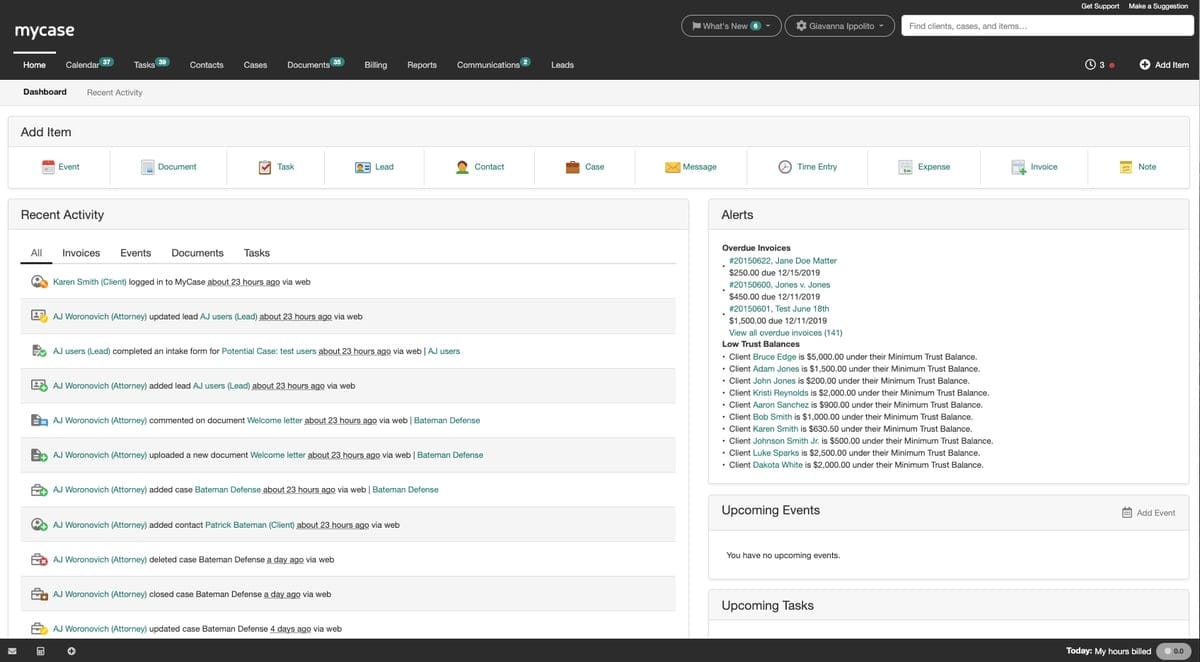
Source: G2
One of the standout features of MyCase is the ability for clients to have real-time access to their case files and information. This means that at any moment, they can log in to the portal to review documents, see the latest updates, and track the progress of their case.
Such access demystifies the legal process for clients and helps them feel more involved and informed about the proceedings of their cases.
Best Features
- Case and document management: Organizes case files, emails, and client records in a single dashboard.
- Built-in billing and payments: Supports online payments, time tracking, and automated invoicing.
- Client communication portal: Provides a secure space for messaging, document sharing, and updates.
- Task and workflow automation: Helps organize and speed up repetitive administrative tasks.
- Mobile app: Allows attorneys to manage cases and communicate with clients on the go.
Pros
- Intuitive and user-friendly interface
- Secure cloud-based access from any device
- Integrated payment processing with online billing
- Organizes client communication with a dedicated portal
Cons
- Limited customization for reports and workflows
- Some integrations require additional setup
- Mobile app has fewer features than the desktop version
5. LawPay
LawPay is a legal payment processing platform designed to help law firms securely accept online payments while staying compliant with ABA and IOLTA regulations.
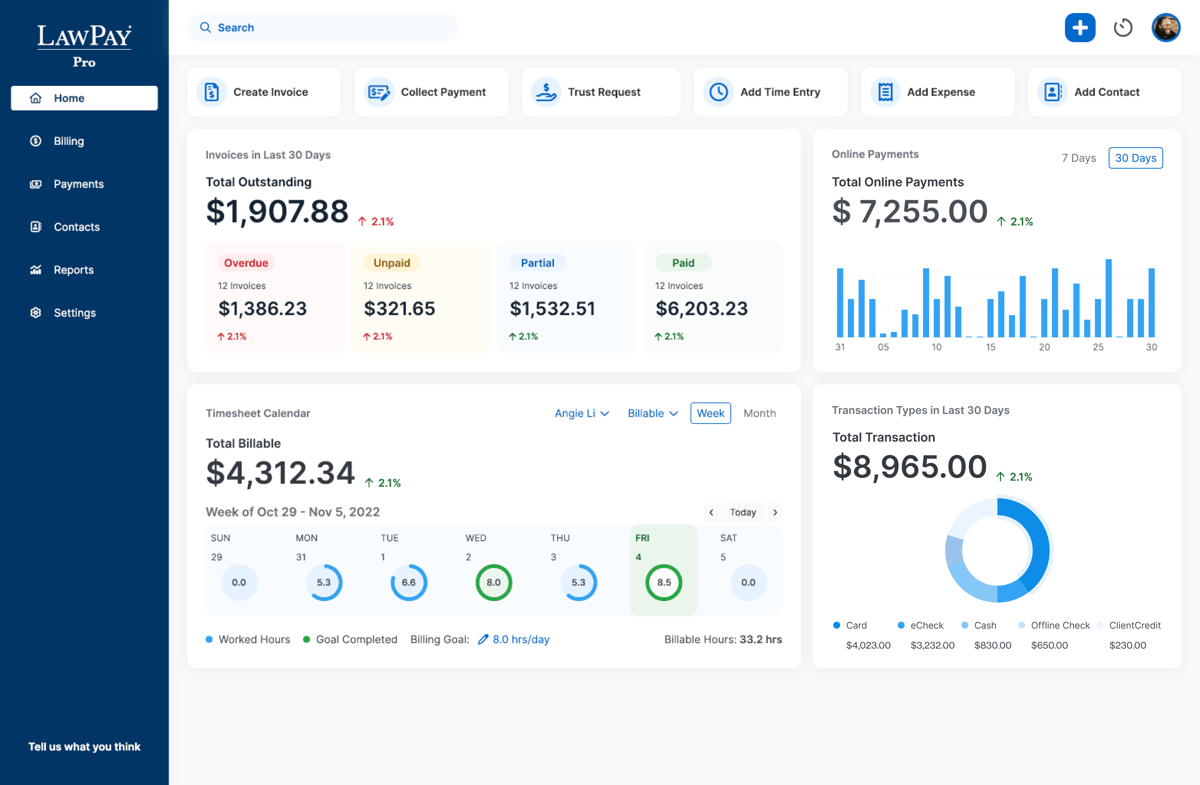
Source: G2
For litigation lawyers, it simplifies tracking billable hours by integrating with time-tracking and invoicing tools. Ultimately, it helps maintain accurate client billing.
Best Features
- Trust accounting compliance: Keeps client funds separate and ensures IOLTA and ABA compliance.
- Multiple payment options: Accepts credit cards, debit cards, and eChecks.
- Secure online payments: Provides a client-facing payment portal for easy transactions.
- Integration with legal software: Connects with Clio, MyCase, and other practice management tools.
- Recurring and scheduled payments: Automates billing for retainers and ongoing client payments.
Pros
- Helps litigation lawyers track all billable hours efficiently
- Maintains trust accounting compliance
- Easy-to-use client payment portal
- Integrates with major legal management platforms
Cons
- Processing fees may be higher than general payment processors
- Limited features beyond payment processing
- No built-in invoicing (relies on integrations)
Best Practices for Using Legal Technology
Implementing litigation technology effectively goes beyond selecting the right tools; to truly enhance the practice of law, you also need a strategic approach to integration, usage, and ongoing management.
Here are some best practices for law firms looking to make the most of legal technology:
Prioritize Training and Education
Just having the right legal tech isn’t enough—everyone on your team needs to know how to use it effectively. A solid training plan helps legal professionals get up to speed quickly so they’re not wasting time figuring things out on their own.
Start with a structured onboarding process that walks users through essential features and workflows. But don’t stop there—ongoing education is just as important. For example, you can:
- Host live training sessions
- Provide on-demand tutorials
- Set up refresher courses
- Create a knowledge base
- Encourage peer learning
The more comfortable they are with the tools, the more efficiently they can get work done.
Implement Strong Security Measures
Law firms handle sensitive client data every day, so security has to be a top priority. Encryption keeps documents and communications safe, while regular software updates help close security gaps that hackers might exploit.
It’s also a good idea to run periodic security audits to catch vulnerabilities before they become a problem. Adding multi-factor authentication (MFA) and role-based access controls can further limit who gets access to what.
Security isn’t a one-and-done task—ongoing training helps staff spot phishing attempts, use secure networks, and follow cybersecurity best practices.
Focus on Client Data Protection
Keeping client data safe is non-negotiable in legal practice. That means using encrypted emails, secure client portals, and other protected channels instead of standard messaging apps.
Staff should also be trained on confidentiality protocols to prevent accidental data leaks. And when adopting new legal tech, make sure it meets security standards like GDPR or ABA guidelines.
Regular data backups and a solid disaster recovery plan help make sure client information stays protected, even if a cyberattack or system failure occurs.
Embrace Flexibility and Scalability
Legal technology is always evolving, so law firms need tools that can grow with them. Choosing flexible and scalable solutions makes sure that as needs change—whether due to firm expansion, new regulations, or emerging tech—there’s no disruption to daily operations.
Cloud-based and modular platforms make it easier to integrate new features without overhauling existing systems. It’s also worth keeping up with legal tech news to find new opportunities to upgrade your litigation workflows.
Optimize for Collaboration and Accessibility
Legal work often requires teamwork, and the right technology should make that easier, not harder. Cloud-based tools allow staff to access case files, documents, and communications from anywhere, whether they’re in court, at the office, or working remotely.
Cross-device compatibility provides a seamless experience, keeping lawyers, paralegals, and clients connected and productive no matter where they are
Monitor and Analyze Technology Performance
Investing in legal technology is only worth it if it actually improves efficiency. Firms should routinely track how these tools impact productivity, case outcomes, and overall workflow.
Regular assessments help determine whether a tool is meeting expectations or if adjustments—such as training, upgrades, or replacements—are needed to maximize its value.
Incorporating Technology in Your Practice Doesn’t Have to Be Difficult
The legal world is always rife with competition, and that won’t change any time soon. Stay ahead of your competitors by integrating new systems into your practice areas, starting with automation tools that can make work easier.
Use the power of artificial intelligence to get rid of the bottlenecks in litigation. With Briefpoint, you can take out hours upon hours of work spent on just drafting discovery documents. Save your brain power for more value-adding tasks and let Briefpoint do the work.
Automate Your Discovery Phase With Briefpoint
Discovery responses cost firms $23,240, per year, per attorney. $23,240 estimate assumes an associate attorney salary of $150,000 (including benefits – or $83 an hour), 20 cases per year/per associate, 4 discovery sets per case, 30 questions per set, 3.5 hours spent responding to each set, and 1800 hours of billable hours per year.
Book a demo and save on these costs with Briefpoint.
FAQs About About Legal Tech for Litigation
Will legal tech replace legal professionals?
Legal technology is designed to augment the capabilities of legal professionals, not replace them. It takes over repetitive and time-consuming tasks, freeing up lawyers to focus on more complex, strategic aspects of their cases that require human judgment, empathy, and ethical considerations.
Is legal tech expensive?
The cost of legal tech varies widely depending on the solution, ranging from affordable subscriptions for basic tools to significant investments for comprehensive platforms. However, focusing solely on the upfront cost misses the bigger picture. Legal tech should be viewed as an investment that can lead to substantial savings and efficiency gains in the long run.
Can small law firms benefit from using legal tech?
Absolutely, and in many ways, legal tech can be a game-changer for small firms. While smaller practices may lack the extensive resources of larger firms, legal technology levels the playing field, allowing them to compete more effectively. For small firms, efficiency and the ability to provide personalized service are crucial competitive advantages.
The information provided on this website does not, and is not intended to, constitute legal advice; instead, all information, content, and materials available on this site are for general informational purposes only. Information on this website may not constitute the most up-to-date legal or other information.
This website contains links to other third-party websites. Such links are only for the convenience of the reader, user or browser. Readers of this website should contact their attorney to obtain advice with respect to any particular legal matter. No reader, user, or browser of this site should act or refrain from acting on the basis of information on this site without first seeking legal advice from counsel in the relevant jurisdiction. Only your individual attorney can provide assurances that the information contained herein – and your interpretation of it – is applicable or appropriate to your particular situation. Use of, and access to, this website or any of the links or resources contained within the site do not create an attorney-client relationship between the reader, user, or browser and website authors, contributors, contributing law firms, or committee members and their respective employers.

